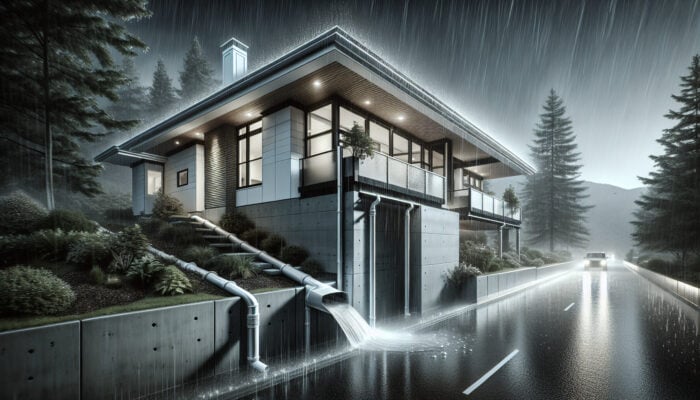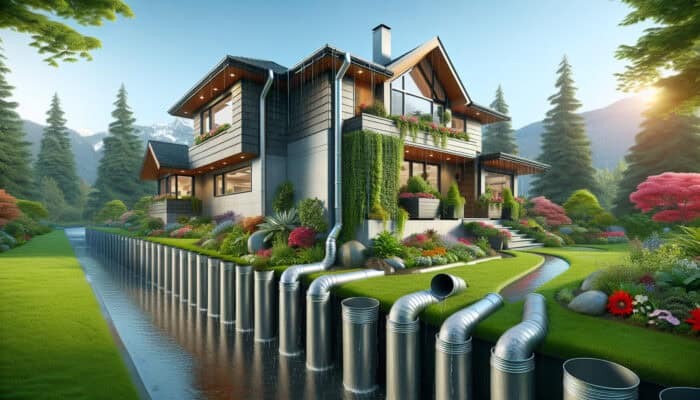Understanding the Essential Role of Effective Downspout Drainage Systems
Why Is It Important for Homeowners to Prioritise Downspout Drainage?

Establishing proper downspout drainage is crucial for safeguarding your home against the detrimental consequences of water accumulation. In areas like Vancouver, which experience significant rainfall, having a robust drainage system is vital to prevent water from pooling near your foundation. Stagnant water can lead to severe risks, including soil erosion and potential threats to your home’s structural integrity. By efficiently directing water away from your foundation, you not only protect your property’s value but also extend the lifespan of your home’s overall structure, ensuring it continues to be a safe refuge for many years to come.
Moreover, ensuring effective drainage minimises the likelihood of mould and mildew proliferation, which flourish in damp environments. These fungi can weaken your home’s structure and pose serious health threats to your family. Therefore, addressing downspout drainage is not merely about protecting your property; it is also about fostering a healthy living environment for everyone inside your home, thereby promoting overall well-being and comfort.
What Risks Are Linked to Inadequate Drainage on Your Property?
The consequences of insufficient downspout drainage can be serious and extensive. One immediate concern is the danger of basement flooding. If downspouts are improperly installed or incorrectly oriented, water can back up and overflow, resulting in damp, unusable spaces and potential structural damage. Ignoring this issue can lead to escalating problems, requiring costly repairs and extensive renovations if not addressed swiftly.
Additionally, inadequate drainage encourages mould and mildew growth, which can permeate your home’s walls and deteriorate indoor air quality. This situation may contribute to respiratory illnesses and other health complications for residents. Over time, persistent exposure to moisture can compromise your foundation, causing cracks and shifts—conditions that threaten the entire integrity of your home. Addressing these drainage issues is not merely an aesthetic concern; it’s essential for your home’s safety and structural soundness, ensuring a secure and healthy living environment.
What Advantages Can You Derive from Professional Drainage Services?
Engaging expert downspout drainage services in Vancouver presents numerous benefits that can significantly mitigate water-related challenges on your property. Here are some key advantages:
- Expert Assessment: Professionals can pinpoint specific drainage issues that homeowners might overlook, ensuring a comprehensive understanding of the situation.
- Quality Installation: Experts guarantee that drainage systems are installed correctly, greatly reducing the risk of future complications.
- Time-Saving: Professionals handle projects efficiently, alleviating the stress and hassle associated with do-it-yourself solutions.
- Long-Term Solutions: Professional services often come with warranties, offering lasting protection against water damage.
- Comprehensive Maintenance: Regular maintenance services ensure that your drainage systems remain effective and functional over time.
- Increased Property Value: Well-maintained drainage systems enhance your home’s marketability and overall worth, making it a prudent investment.
- Peace of Mind: Knowing that experts are managing your drainage needs reduces stress and uncertainty, allowing you to focus on other aspects of homeownership.
These benefits highlight the importance of investing in professional services rather than attempting to tackle drainage problems independently. Their expertise guarantees your home remains shielded from the adverse effects of water damage, enhancing your property’s longevity and value.
What Are the Most Effective Solutions for Common Downspout Drainage Issues?

Proactively tackling downspout drainage challenges can save homeowners significant time and financial resources. Common solutions include extending downspouts to ensure water is directed well away from the foundation, effectively preventing pooling. This simple modification can considerably diminish the risk of water damage to your property and promote effective drainage.
Another efficient approach involves the installation of French drains. These systems consist of perforated pipes buried underground to channel excess water away from your property. Such a solution is particularly advantageous in Vancouver, where heavy rainfall can overwhelm standard drainage systems. Additionally, employing rain barrels can be an eco-friendly manner of managing runoff, allowing homeowners to conserve rainwater for gardening or other uses, thus contributing to water conservation efforts.
Each of these options presents unique benefits and can be customised to address the specific needs of your home and its drainage challenges. Consulting a professional can assist you in identifying the best strategies for your property, ensuring optimal performance and protection against water-related issues.
Expert Perspectives on Downspout Drainage Services in Vancouver
What Distinguishes Vancouver’s Drainage Requirements?
Vancouver’s unique climate, marked by considerable rainfall and varied terrain, necessitates specialised downspout drainage services. The city endures heavy precipitation, particularly during the autumn and winter months, making it essential for homeowners to implement effective drainage systems capable of handling substantial water influxes. The diverse topography, featuring both slopes and flat areas, complicates drainage strategies and requires tailored solutions to ensure proper water management.
Recognising these local conditions enables drainage professionals to devise systems that can withstand Vancouver’s weather patterns. This localized expertise is crucial for optimising the functionality of your downspout drainage system, ensuring efficient management of stormwater runoff throughout the year while protecting your property from potential water damage.
How Can Professionals Enhance Your Downspout System’s Efficiency?

Experts can perform an in-depth analysis of your existing downspout drainage system to identify performance deficiencies and propose enhancements tailored to Vancouver’s specific climatic conditions. For instance, professional evaluations may uncover that extending downspouts or adjusting their angles can significantly improve water flow away from your building. Professionals frequently utilise simulations to visualise water movement, suggesting designs that increase efficiency and effectiveness in managing stormwater, ensuring your system operates optimally.
What Best Practices Should You Follow for Maintaining Your Downspout Systems?
Regular maintenance of your downspout drainage systems is essential to ensure their long-term effectiveness and reliability. Homeowners should adhere to the following best practices:
- Conduct regular inspections of downspouts for clogs caused by leaves and debris accumulation.
- Ensure downspouts direct water away from the foundation, ideally at least six feet, to prevent pooling.
- Clean gutters and downspouts at least twice a year, particularly before the rainy season, to maintain clear pathways for water.
- Check for rust or damage in the downspouts that may necessitate prompt repair or replacement.
- Consider seasonal adjustments to downspouts based on anticipated rainfall patterns, enhancing their performance.
- Utilise gutter guards to minimise debris accumulation and reduce maintenance frequency.
- Monitor for signs of water pooling and address any drainage concerns immediately to prevent escalation.
By implementing these maintenance practices, homeowners can keep their systems functioning at peak performance, significantly decreasing the risk of water damage and other related complications, thus safeguarding their investment.
Exploring Various Types of Downspout Drainage Systems
What Are the Features of Traditional Downspout Systems?
Traditional downspout systems consist of gutters and downspouts that effectively channel rainwater away from a home’s foundation. These systems are cost-effective and commonly found in Vancouver homes due to their straightforward design and reliable performance. Their primary function is to capture rainfall from the roof and direct it through the downspouts to a designated drainage area, offering protection against potential flooding.
However, without appropriate installation and routine maintenance, traditional systems can become ineffective over time. Homeowners must ensure that all components are in good condition and that water is being directed accurately. Conducting regular inspections and maintenance of these systems can help avert the myriad problems associated with poor drainage, ensuring their long-term efficacy.
How Do French Drain Systems Operate?
French drain systems provide an excellent solution for managing excess water, particularly in regions with high rainfall, such as Vancouver. These systems consist of a perforated pipe laid within a gravel-lined trench, allowing water to flow into the pipe, which then redirects it away from the property, effectively preventing flooding in basements and low-lying areas.
The effectiveness of French drains can be significantly enhanced when they are strategically positioned based on a thorough assessment of your property’s drainage needs. Professionals can install these systems to intercept both surface water and groundwater, making them a holistic solution for effective water management and safeguarding your property against water-related issues.
What Advantages Do Subterranean Downspouts Offer?
Buried downspouts present various benefits, especially in urban environments where maintaining visual appeal is crucial. By directing water underground, homeowners can eliminate the risk of surface clogs and sustain an aesthetically pleasing landscape. This method not only enhances the visual value of your property but also significantly reduces the likelihood of overflow during heavy rainfall events.
Furthermore, buried downspouts are less susceptible to debris, such as leaves or branches, that can obstruct traditional above-ground systems. This proactive approach ensures that water is efficiently channelled away from your foundation, protecting your home from potential water damage and contributing to a more effective drainage strategy.
What Are the Benefits of Rainwater Harvesting Systems?
Rainwater harvesting systems provide an eco-friendly method for managing runoff while also supplying a sustainable water source for gardening and other applications. In Vancouver, where rainfall is abundant, these systems can significantly reduce water bills and lessen the environmental impact associated with municipal water usage.
Typically, these systems involve collecting rainwater from rooftops through a network of gutters and downspouts, directing it into storage tanks. With proper filtration and treatment, harvested rainwater can be rendered suitable for irrigation, promoting a sustainable approach to water management. Not only does this contribute to conserving potable water, but it also helps minimise stormwater runoff, which is essential for preserving local ecosystems and maintaining environmental health.
How Do Dry Well Systems Operate?
Dry well systems are designed to absorb and distribute excess water underground, effectively preventing surface pooling. These systems are particularly effective in regions where soil has low absorption rates or where surface drainage is inadequate, making them a practical choice for many homeowners.
Dry wells consist of a substantial, permeable structure, often filled with gravel, that collects water from downspouts or surface runoff. This design enables water to gradually seep into the ground, replenishing the soil and minimising the risk of flooding. Installing a dry well can be an excellent solution for homeowners looking to enhance their drainage capabilities while adhering to local regulations concerning stormwater management, ensuring compliance and environmental responsibility.
Guidelines for Choosing the Right Drainage Service Provider
What Qualifications Should You Seek in a Service Provider?
When selecting a downspout drainage service provider, it’s crucial to find professionals with appropriate certifications and extensive experience in the local market. Ensure that the provider is licensed and insured, which safeguards you against potential liabilities during the project.
Moreover, familiarity with Vancouver’s unique drainage challenges and local building codes can significantly enhance the effectiveness of the service provided. Experienced professionals can offer customised solutions that address your specific drainage concerns, ensuring that the systems installed comply with all necessary regulations and standards, thus delivering reliable, long-lasting results.
Why Is Local Expertise Vital for Effective Drainage Solutions?
Local expertise in drainage solutions is invaluable when addressing the unique challenges posed by Vancouver’s climate and geography. Professionals with a deep understanding of local regulations can deliver tailored solutions that effectively manage water runoff and prevent common issues such as flooding or soil erosion.
Additionally, local providers often maintain established relationships with suppliers and contractors, facilitating more efficient project completion. Their comprehension of regional terrain can lead to innovative approaches that enhance drainage performance, ensuring your property remains safe and secure against potential water-related challenges, making them an essential resource for homeowners seeking dependable drainage services.
How Should You Assess Service Quotes for Drainage Projects?
When reviewing service quotes for drainage solutions, it’s essential to consider several factors beyond just the pricing. Look for detailed information regarding the specific services included, the quality of materials proposed, and the reputation of the provider.
A thorough quote should outline the scope of work, timelines, and any warranties or guarantees offered. Do not hesitate to request references or examples of previous projects similar to yours. This information can provide valuable insights into the provider’s reliability and service quality, ensuring you make a well-informed decision that meets your drainage needs.
What Should You Expect from a Professional Consultation?
A professional consultation should commence with a comprehensive assessment of your property’s drainage requirements. The provider should evaluate existing systems, identify potential issues, and discuss customised solutions tailored to your unique situation, ensuring a holistic approach to your drainage needs.
During this initial meeting, it is crucial that the provider listens to your concerns and delivers clear, transparent communication regarding the proposed solutions and associated costs. A trustworthy provider will offer a realistic timeline for project completion and explain all steps involved in the installation or maintenance process, fostering trust and clarity throughout the engagement.
How Do Customer Reviews and Testimonials Influence Your Decision-Making?
Customer reviews and testimonials serve as a valuable resource when selecting a drainage service provider. Feedback from previous clients can offer insights into the quality, reliability, and effectiveness of the services rendered, guiding your decision-making process.
Look for providers who consistently receive positive feedback regarding their workmanship and customer service. Case studies showcasing successful projects can also highlight the provider’s expertise in addressing specific drainage challenges, assisting you in making a well-informed choice when selecting the right contractor for your needs, ensuring satisfaction and peace of mind.
Research-Supported Benefits of Downspout Drainage Services in Vancouver
How Does Effective Drainage Influence Home Value?
Implementing efficient downspout drainage systems significantly enhances your home’s resale value. Properties equipped with reliable drainage solutions are less likely to experience water damage issues, making them more appealing to prospective buyers seeking a secure investment.
Research indicates that well-maintained homes tend to sell more rapidly and at higher prices compared to those with unresolved drainage concerns. Investing in proper drainage not only shields your property from immediate damage but also serves as a long-term investment that yields significant returns when it comes time to sell, ensuring your home’s market value remains protected.
What Are the Long-Term Financial Benefits of Professional Services?
Investing in professional drainage services can result in substantial long-term financial savings. By proactively addressing drainage challenges, homeowners can avoid the costly repairs associated with water damage, such as mould remediation, foundation repairs, and extensive renovations that can accumulate rapidly.
A well-maintained drainage system can save homeowners hundreds, if not thousands, of pounds over time. For instance, regular inspections and maintenance can identify minor issues before they escalate into significant problems, ensuring your home remains protected from the elements while minimising overall repair costs, thus maximising your investment.
What Is the Environmental Impact of Efficient Drainage Practices?
Effective downspout drainage systems offer numerous environmental benefits. Properly designed drainage systems help manage stormwater runoff, reducing soil erosion that can lead to the degradation of local ecosystems and natural landscapes.
Moreover, efficient drainage minimises the risk of contaminants entering local waterways, contributing to a healthier aquatic environment. Key environmental advantages of effective drainage systems include:
- Reduction of stormwater runoff, protecting local water bodies from pollution.
- Prevention of soil erosion, maintaining land integrity and promoting healthy ecosystems.
- Promotion of groundwater recharge, supporting local wildlife and vegetation.
- Minimised contamination of natural resources, fostering cleaner environments for all.
By implementing sustainable drainage solutions, homeowners can play a vital role in preserving the environment while effectively managing water runoff, contributing to a healthier community and ecosystem.
How Can Effective Drainage Systems Improve Curb Appeal?
A thoughtfully designed drainage system can significantly enhance the curb appeal of your property. Effective drainage solutions not only protect your home from water damage but also beautify the overall aesthetics of your landscape, making it more inviting to visitors and prospective buyers alike.
Strategically placed drainage features can integrate seamlessly into your yard, enhancing its beauty while serving a crucial functional purpose. Investing in visually appealing drainage solutions adds to your home’s overall value and marketability, making it a vital consideration for homeowners aiming to elevate their property’s appeal and desirability.
What Health Benefits Are Associated with Preventing Water Accumulation?
Implementing effective drainage solutions to prevent water accumulation yields significant health benefits for you and your family. Properly managed drainage keeps your home dry, reducing the risk of mould growth, which can lead to respiratory issues and other health complications.
In addition to promoting a healthier living environment, effective drainage systems help mitigate risks associated with standing water, such as mosquito breeding, which can transmit diseases. By ensuring your property has a reliable drainage system in place, you create a safer and healthier home for your loved ones, enhancing overall well-being and comfort.
Identifying Common Downspout Drainage Issues in Vancouver
What Leads to Clogged Downspouts and Gutters?
One of the most common challenges homeowners face with downspout drainage is clogging due to debris accumulation. Leaves, twigs, and dirt can obstruct water flow, resulting in overflow and potential damage to your home’s foundation. In Vancouver, where foliage is plentiful, regular cleaning of gutters and downspouts is essential for maintaining efficient drainage.
Implementing preventive strategies, such as installing gutter guards, can help minimise debris buildup and reduce the frequency of required maintenance. Homeowners should conduct inspections at least biannually to ensure optimal performance and address any clogs before they escalate into more severe issues, thereby preserving the integrity of the drainage system.
What Are the Common Causes of Leaks in Downspouts?
Leaks in downspouts can arise from various issues, including improper installation, aging materials, or damage incurred during severe weather events. These leaks can undermine the effectiveness of your drainage system, leading to potential water damage on your property if left unaddressed.
Promptly identifying the source of downspout leaks is crucial in preventing further complications. Homeowners should routinely inspect their downspouts for signs of wear, corrosion, or gaps that may necessitate immediate attention. Proactively addressing these concerns can help maintain a reliable drainage system and protect your property from water-related damage.
How Can You Recognise Foundation Damage Due to Poor Drainage?
Recognising the signs of foundation damage related to inadequate drainage is essential for homeowners. Common indicators include visible cracks in walls, uneven floors, and doors that stick or fail to close properly. These symptoms may suggest that water is infiltrating your foundation due to insufficient drainage.
If you observe these issues, it is vital to conduct a thorough assessment as soon as possible. Engaging a professional for an evaluation can help determine the extent of the damage and suggest necessary repairs. Taking timely action can save homeowners from substantial repair costs and ensure the long-term stability of their property, safeguarding their investment.
Comparing DIY and Professional Downspout Drainage Solutions
When Is It Suitable to Consider DIY Downspout Drainage Solutions?
DIY projects can be appropriate for basic maintenance tasks related to downspout drainage, such as cleaning gutters, adjusting downspout extensions, and inspecting systems for visible problems. Simple tasks can often be accomplished without professional assistance, allowing homeowners to save both time and money.
However, homeowners should exercise caution and recognise the limitations of DIY efforts. For more complex drainage issues, such as the installation or repair of underground systems, it is advisable to consult professionals. Attempting to tackle these problems without adequate knowledge can lead to ineffective solutions, exacerbating existing issues rather than resolving them.
What Risks Are Associated with DIY Drainage Projects?
While DIY projects can be cost-effective, there are inherent risks involved with managing downspout drainage solutions without proper expertise. Poorly executed DIY work can lead to ineffective drainage, increasing the likelihood of water damage and potential safety hazards.
Incorrect installation can redirect water back toward your foundation, complicating existing problems. Furthermore, a lack of awareness regarding local regulations and building codes can result in violations, leading to costly fines or additional work to comply with legal requirements. Engaging professionals ensures that the job is completed accurately and safely, protecting your investment and ensuring compliance.
What Are the Advantages of Hiring Professionals for Complex Projects?
Engaging professionals for intricate downspout drainage projects offers numerous advantages. Experts possess the essential tools, knowledge, and experience to effectively address complex drainage issues. They can conduct comprehensive assessments and develop tailored solutions that cater to the specific concerns and challenges unique to your property.
Additionally, professional services typically include warranties or guarantees, providing peace of mind and protection against potential future complications. This level of assurance is invaluable for homeowners looking to invest in long-lasting drainage solutions that enhance the reliability and efficiency of their systems, ensuring their home remains protected from water-related issues.
Future Innovations in Downspout Drainage Technology
How Are Smart Drainage Systems Expected to Evolve?
The evolution of smart drainage systems is poised to transform the management of downspout drainage in the coming years. These systems will leverage advanced technology, including sensors and automation, to optimise water management processes. By monitoring rainfall data and adjusting drainage flow accordingly, homeowners can reduce manual intervention while maximising efficiency and effectiveness.
Such intelligent systems not only enhance the performance of drainage solutions but also provide real-time feedback to homeowners about water flow and potential issues. As technology progresses, these smart systems are likely to become standard in modern drainage solutions, ensuring optimal functionality and reliability while adapting to changing environmental conditions.
What Role Will Eco-Friendly Materials Have in Future Drainage Systems?
The future of downspout drainage solutions will increasingly focus on the use of eco-friendly materials, such as recycled plastics or sustainable composites. These materials deliver durability and performance while minimising environmental impact and promoting responsible resource utilisation.
Incorporating sustainable materials into drainage systems will not only help reduce the carbon footprint of construction projects but also resonate with environmentally conscious consumers seeking responsible home improvement solutions. As the industry evolves, the integration of sustainable practices will be critical in shaping new drainage technologies, making them both effective and environmentally friendly.
How Will Climate Change Influence Drainage Solutions?
As climate change continues to affect weather patterns, the demand for adaptive drainage solutions will become increasingly important. With rising sea levels and more frequent extreme weather events, such as heavy rainfall or storms, drainage systems must be designed to effectively accommodate these changes.
Future downspout drainage solutions will prioritise resilience and adaptability, ensuring that systems can withstand unexpected weather variations. This focus on performance and durability will be essential for protecting properties against the impacts of climate change, providing homeowners with peace of mind amidst shifting environmental conditions and safeguarding their investment.
FAQs
What Are the Signs of Poor Downspout Drainage?
Indicators include water pooling around the foundation, overflowing gutters, and mould growth in basements. Visible cracks in walls or doors that stick or fail to close properly may also signal inadequate drainage.
How Often Should I Clean My Gutters for Optimal Performance?
Gutters should be cleaned at least twice a year, preferably before the rainy season, to prevent debris accumulation that can lead to clogs and overflow.
Can I Install a Downspout System by Myself?
Basic tasks like cleaning gutters are manageable as DIY projects. However, complex installations are best left to professionals to ensure effectiveness and compliance with local codes and regulations.
What Is a French Drain?
A French drain is a trench filled with gravel and a perforated pipe that redirects water away from your property, helping to prevent flooding and manage excess moisture effectively.
How Can I Prevent Clogs in My Downspout System?
Regular cleaning, installing gutter guards, and trimming nearby trees can help prevent clogs in your downspout system, ensuring optimal water flow and drainage performance.
What Materials Are Recommended for Modern Drainage Systems?
Sustainable materials such as recycled plastics and durable composites are highly recommended for contemporary drainage systems, providing both performance and environmental benefits that align with modern standards.
How Can I Detect If My Downspout Is Leaking?
Signs of leaks include visible water stains around the downspout area, pooling water, or damp spots on walls. Regular inspections can help identify leaks early on, preventing further damage.
What Is the Average Cost for Professional Drainage Services?
The cost can vary based on the project’s complexity but typically ranges from a few hundred to several thousand pounds. Obtaining multiple quotes will help provide accurate estimates and options for your specific needs.
How Can I Enhance My Home’s Drainage System?
Consider professional assessments, install rain barrels, or add French drains to improve water management and protect your home from potential water damage, ensuring effective drainage solutions.
Is It Necessary to Hire a Local Expert for Drainage Solutions?
Yes, local experts understand the specific drainage challenges in Vancouver and can provide tailored solutions that meet local regulations while effectively addressing unique environmental factors.
Connect with us on Facebook!
The Article: Downspout Drainage Services in Vancouver: Expert Solutions First Published On: https://pacificbluemechanical.ca/
The Article Downspout Drainage Services: Expert Solutions in Vancouver Was Found On https://limitsofstrategy.com

